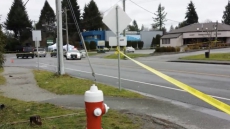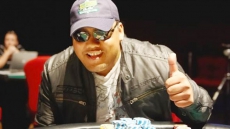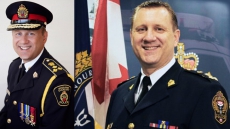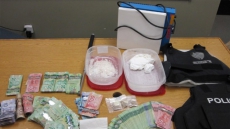OTTAWA — It's been quite the year for Justin Trudeau.
He scored a stunning come-from-behind election victory, became the first offspring of a prime minister to ascend to the top job himself and the first federal leader to vault his party straight from a distant third place into office, circled the globe and created an international sensation. All in the last three months of 2015.
And now he's been selected as Canada's Newsmaker of the Year.
Unlike the hard-fought Oct. 19 election, it wasn't much of a contest.
"Trudeau was the runaway choice of news editors and directors across the country," said Stephen Meurice, Editor-in-Chief of The Canadian Press.
Fully 87 per cent chose Trudeau as the top newsmaker in The Canadian Press's annual survey of newsrooms across the country.
Rachel Notley, the NDP leader who put an end to the four-decade Conservative dynasty in Alberta, came a distant second, chosen as top newsmaker by just seven per cent of those surveyed.
Little Alan Kurdi, the toddler whose lifeless body on a Turkish beach put a human face on the Syrian refugee crisis and pushed the issue smack into the midst of the federal election campaign, was one vote behind Notley.
It was "no contest," wrote Carl Fleming, managing editor at the Cape Breton Post. "Everybody is talking about Justin."

Elections are always big news but it was the historic nature of Trudeau's win that made him so compelling to some newsroom leaders.
"Trudeau's victory was historic on a number of levels," said Tim Kucharuk, senior reporter at CKRW The Rush in Whitehorse.
"First to go from third party to government, first to complete father-son duo as PM. Came up with some of the most quoted lines of the year ... 'Sunny ways' and 'Canada is back.' The victory turned Ottawa upside down after 10 years of Conservative power."
Others were impressed by the way in which Trudeau, contemptuously derided as an empty-headed pretty boy by the Conservative attack machine and trailing in the polls at the start of the campaign, managed to exceed expectations and leave his more experienced rivals in the dust.
"Expectations were so low for this son of an iconic Canadian leader that his rivals once scoffed he'd score debate points from the public if he just 'came on stage with his pants on,'" said Margo Goodhand, editor of the Edmonton Journal.
"Amid an onslaught of carefully orchestrated contempt, third place in the polls, 'Justin' fought back to a resounding majority win, toppling a 10-year (Conservative) dynasty and becoming Canada's 23rd prime minister. Not bad for the guy with 'nice hair.'"
Maurice Cloutier, editor in chief of La Tribune in Sherbrooke, Que., said Trudeau led "an audacious campaign," outflanking the NDP on the left with his promises to run modest deficits and stimulate the economy with massive infrastructure investments. He also managed to turn the unprecedented length of the campaign —an 11-week marathon the Conservatives believed would magnify Trudeau's weaknesses — to his advantage, Cloutier said.
What's more, he managed to capture a majority of seats in Quebec, a feat not achieved by any federal governing party since 1988 and the Liberals' best result since Trudeau's late father, Pierre, last swept the province in 1980.
"He ran a flawless election campaign," said Michel Lorrain, vice-president of information and programming for Cogeco Diffusion Inc.

"The strong return of the Liberals in Quebec surprised everyone."
But as much as anything, the tale of Trudeau's triumph just made for a darned good story.
He revived a party left on its death bed in 2011, when the Liberals won just 34 seats and fell behind the NDP for the first time in history. He withstood a barrage of Tory attack ads that declared him "just not ready." He survived the pressure of a high-stakes campaign in which one false step could have spelled the demise of Liberal party.
And he did it without descending into the political gutter, remaining resolutely positive and projecting a sunny, youthful optimism that made his opponents seem old and grumpy.
Since the election, Trudeau has won international acclaim for insisting on gender parity in his cabinet "because it's 2015" and for throwing open Canada's doors to Syrian refugees. He's also attended a whirlwind series of international summits, greeted by fawning headlines about his looks and, in one case, by squealing female admirers.
"The narrative of Trudeau's trajectory was surprising and dramatic as he took his Liberals from rump to ruling party," summed up Paul Samyn, editor at the Winnipeg Free Press.
"His campaign meant we had a real three-way race for power and his victory lap attracted global attention in ways we haven't seen for a Canadian prime minister."
"It's a little bit fairy tale, isn't it?" said Elisha Dacey, managing editor of Metro Winnipeg.

"The son of a popular (and also reviled) prime minister takes up where his father left off and immediately institutes sweeping cultural changes in the PMO ... that will resonate for years. It's a sweeping come-from-behind tale that alters the Canadian political landscape."
EVENTS THAT MARKED TRUDEAU'S TRANSFORMATION FROM TEACHER TO PRIME MINISTER
OTTAWA — A chronology of the seminal events that marked Justin Trudeau's transformation from school teacher to prime minister:
Oct. 3, 2000: 28-year-old Justin Trudeau delivers an emotional eulogy at the state funeral for his father, former prime minister Pierre Trudeau. Speech generates first buzz about potential political dynasty in the making, but Trudeau has no interest in following in his father's footsteps; returns to teaching job in Vancouver.
December 2006: Trudeau attends Liberal leadership convention in Montreal as a supporter of former Ontario education minister Gerard Kennedy. Discovers he enjoys schmoozing with delegates and is good at retail politics — more like his grandfather, Jimmy Sinclair, than his father, who disliked the baby-kissing aspect.
"Looking back at my transition into political life, that weekend in Montreal really mattered," Trudeau wrote in his memoir, "Common Ground."
"The experience of the convention had taught me something: I had political skills independent of my last name."

December 2006: Tells new leader Stephane Dion he'd like to run for the Liberals in a byelection in the Montreal riding of Outremont. Backs off after it becomes clear the leader and the riding association are opposed (future NDP leader Tom Mulcair would eventually win the byelection, stealing away what had been a Liberal fiefdom).
Trudeau shifts his sights to Papineau, a gritty, multicultural, working-class riding won by the Bloc Quebecois in the 2006 election. He is undeterred by the fact that neither Dion nor the party establishment are supportive.
"I didn't want a cakewalk. I wanted a serious test of my political abilities," he said in his memoir.
April 29, 2007: Wins the Papineau nomination on the first ballot, easily defeating two more experienced candidates.
Oct. 14, 2008: Trudeau narrowly defeats Bloc Quebecois incumbent Vivian Barbot, bucking the Canada-wide trend that resulted in the Liberals' worst electoral showing to that date.
May 2, 2011: Trudeau wins re-election in Papineau, increasing his margin of victory even as the Liberal party plummets into third place with just 34 seats. Leader Michael Ignatieff loses his own seat and resigns. Trudeau categorically asserts he's not interested in becoming leader.

January 2012: Trudeau starts to reconsider his leadership aspirations after attending a party convention where he's impressed by the determination of rank-and-file Liberals to rebuild their party.
March 31, 2012: Trudeau scores a surprise win over Conservative Sen. Patrick Brazeau in a charity boxing match. Brazeau, with military training and a black belt in karate, had been the odds-on favourite. Pundits proclaim match to be a career-defining moment, proving that Trudeau has "star-power charisma and, as he showed in the fight, it’s more than pretty-boy charisma," as Globe and Mail columnist Lawrence Martin put it. Pressure to run for leader increases exponentially.
July 2012: Trudeau and his wife, Sophie Gregoire-Trudeau, host a three-day retreat at Mont Tremblant, Que., with close friends and advisers to discuss a potential leadership bid. Trudeau decides by end of the weekend that he will run.
Oct. 2, 2012: Trudeau makes it official, launches leadership campaign in Papineau on what would have been his late brother Michel's birthday. Promises that improving the lot of Canada's struggling middle class will be his central goal.

April 14, 2013: Trudeau wins the leadership on the first ballot, with more than 80 per cent of the votes cast by more than 100,000 Liberal members and supporters. Party soars into first place in public opinion polls, where it remains for the better part of two years.
Autumn 2014: Extended honeymoon shows first signs of waning after Trudeau announces his MPs will vote in favour of controversial anti-terrorism legislation, with a promise to amend the most egregious provisions if he forms government.
February 2015: Trudeau's promise to forgo cynical politics takes a hit after he welcomes Tory defector Eve Adams into the Liberal caucus. Adams had been barred from seeking re-election as a Conservative after a nasty nomination battle, which cost her fiancee, former prime ministerial communications director Dimitri Soudas, his job as the party's executive director.
May 4, 2015: After resisting pressure to reveal detailed policy before an election, Trudeau unveils the centrepiece of the Liberal platform: more generous child benefits and an income tax cut for the middle class, paid for by a tax hike on the wealthiest one per cent.
May 5, 2015: The policy announcement is overshadowed by the NDP's come-from-behind victory in Alberta's provincial election. The stunning upset puts wind in the sails of federal New Democrats.
May 2015: The Conservatives begin bombarding the airwaves with the ubiquitous "just not ready" ad, featuring a group of supposedly ordinary folks perusing Trudeau's resume and concluding that he's too callow and inexperienced to be prime minister.

Aug. 1, 2015: Liberals launch their first campaign ad, in which Trudeau responds directly to the Tory ad: "I’ll tell you what I’m not ready for. I'm not ready to stand by as our economy slides into recession; I'm not ready to watch hardworking Canadians lose jobs and fall further behind."
Aug. 2, 2015: Prime Minister Stephen Harper launches the longest, costliest federal election campaign in Canadian history. The Liberals start the campaign in third place in opinion polls, trailing the front-running NDP and the Conservatives.
Aug. 6, 2015: Maclean's magazine hosts the first of five campaign debates. Tory campaign spokesman Kory Teneycke quips that Trudeau will exceed expectations "if he comes on stage with his pants on." Trudeau far surpasses the low bar the Tories had set for him, demonstrates ability to go toe-to-toe with his more experienced rivals, Harper and Mulcair. His performance keeps Liberals in the game and improves in subsequent debates. Liberals begin to inch up in the polls.
Aug. 27, 2015: Trudeau announces a Liberal government would run deficits for three years in order to double spending on infrastructure and goose the stagnant economy. The risky move allows him to outflank Mulcair — whose spending promises were constrained by his insistence on balancing the budget — and to cast himself as the only true agent of progressive change.
Sept. 15, 2015: The Federal Court of Appeal rejects the Harper government's attempt to ban a Muslim woman from covering her face with a niqab while taking the oath of citizenship. Harper promises to appeal the ruling and to introduce a law banning face coverings at citizenship ceremonies and, possibly, for front-line public servants as well.

The NDP's base of support in Quebec, where the niqab ban is most popular, starts to crumble as Mulcair defends women's right to cover their faces. Trudeau's defence is even more robust but he uses the issue to cast himself as the polar opposite of Harper and what he portrays as the Tory leader's mean, narrow-minded, divisive approach to politics.
Oct. 4, 2015: Liberals stage a massive rally in ethnically diverse Brampton, Ont., where Trudeau excoriates the Harper government for its stance on the niqab, its determination to revoke the citizenship of dual citizens convicted of terrorism and its promised crackdown on so-called barbaric cultural practices. He promises to replace the Conservatives' "small and meek and fearful" vision of Canada with one that is "open and confident and hopeful."
Video footage from the rally is used to produce a powerful final campaign ad meant to convey an inspiring, unifying leader with unstoppable momentum.
Oct. 19, 2015: Liberals surprise even their own pollster, winning a majority with 184 seats. It's the first time in Canadian history that a party has vaulted from third to first place in an election.

Nov. 4, 2015: Trudeau is sworn in as prime minister and unveils a 30-member cabinet "that looks like Canada" — half men, half women, ethnically diverse and lots of fresh faces.



